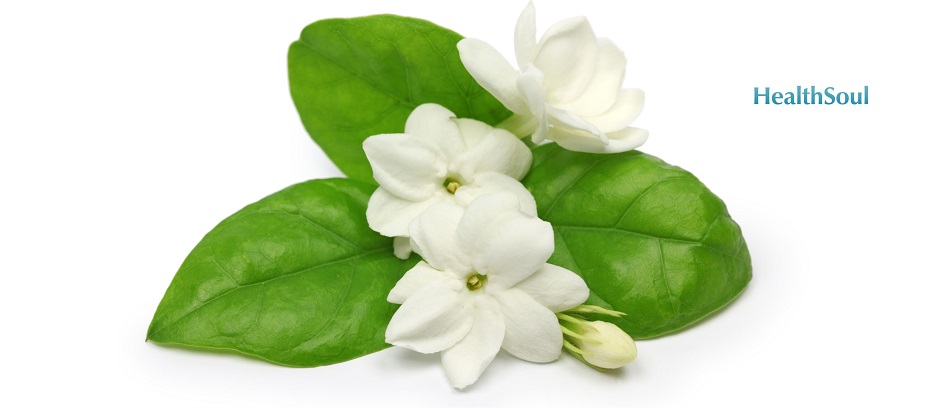
Jasmine sambac is a shrub of Jasmine genera with multiple local names like sampaguita in the Philippines, Arabian jasmine in the mainland USA, mogra in India, moli in China, and pikake in Hawaii. In Philippines, Jasmine sambac has recognized as a National flower. The whole tropical Asian region along with the warm temperate zone of European and African countries is the native place of this plant.
The whole plant has medicinal properties. However, flowers and leaves are very common traditional medicinal ingredients to treat many health problems. Asian countries like Thailand are commercially cultivated Jasmine sambac for its high medicinal value.
The most important characteristic of Jasmine sambac plant is essential oil compositions. The phytochemical and phytonutrient property of this plant contain carbohydrates, fats, proteins, amino acids, flavonoids, glycosides, steroids, coumarins, phenolic compounds, phenolics, tannins, saponins, essential oils, fixed oils, terpenes, resin, and salicylic acid.[3]

The Jasmine sambac flower extract has a vasorelaxation property which is effective to show its effect on the endothelium-intact aorta ring. The presence of bioactive phytochemicals pursues different mechanisms of action by acting on muscarinic receptors present at the vascular endothelium. These phytochemicals also stimulate nitric oxide release. The phytochemical analysis result revealed that the Jasmine sambac flower containing phytochemicals including antioxidants, coumarins, cardiac glycosides, essential oils, flavonoids, phenolics, saponins, and steroids are exerted different medicinal properties. [1]
There are two dosage forms of Jasmine sambac that are commonly available, which are herbal tea, and essential oil.
In a cup of boiling water add one teaspoon of dried Jasmine sambac flower petals. Seep for 5 minutes and enjoy the drink. A combination of green tea and Jasmine sambac herbal tea preparation is also very common.
In aromatherapy, Jasmine sambac essential oil is a common ingredient. It also used as an inhaler to boost mood, relaxation effect with inducing anti-depressant results. In massage, therapy for muscle relaxation combination of Jasmine sambac essential oil with a carrier oil is applied. [4]

Traditionally this plant has antidepressant, anti-inflammatory, analgesic, antiseptic, aphrodisiac, and sedative effects. Every plant part of Jasmine sambac has some traditional medicinal uses.

A research study had shown that the phytochemicals present in Jasmine sambac leaf extracts, including flavonoids, glycosides, alkaloids, tannins, steroids, saponins, and terpenoids have an antimicrobial effect against Staphylococcus aureus, Streptococcus pyogenes, S. mutans, S. sanguinis S. sobrinus, and Lactobacillus acidophilus along with fungi like Candida albicans. All these micro-organisms are often caused by dental infections. Efficacy against these microbial growths of Jasmine sambac leaf extract active against dental infections. [6]
The aqueous extract of Jasmine sambac leaf extract is effective to reduce the elevated blood glucose level. An animal research study reported that oral intake of this dosage form for 21 days can control the elevated blood sugar level. [6]
A cell-based assessment investigation reported that Jasminum sambac has anti-tumor activity. Ethanolic extract of this plant has antiproliferative activity against tumor cell growth. It also has cytotoxic activity, which can effective to treat the tumor.
The cytotoxic effect of Jasminum sambac has shown anti-cancer activity against three human cancer cell lines, including prostate carcinoma cell, lung carcinoma, and breast cancer cell lines. [6]
Methanolic extract of Jasminum sambac has antioxidant activity due to its high essential oil composition. This herbal component acts as free radicals like DPPH scavenging property. Thus this herbal remedy is effective to prevent and control oxidative stress buildup within the body compartment and preventive effect against chronic diseases. Jasminum sambac also slows down the rate of lipid peroxidation to control the free radical generation. [6]
The dried leave extract of Jasminum sambac is effective to control pain symptoms. A comparative study conducted in mice to evaluated the analgesic property of Jasminum sambac leaves with a standard treatment of diclofenac sodium has found a positive result. However, experts suggested furthering detail investigational studies of this herbal remedy. [6]
The essential oil derived from Jasminum sambac has anti-acne property. Ethanolic extract of Jasminum sambac flower has efficacy against acne vulgaris by inhibiting the growth of this acne-causing germs. [6]
Viral infections usually cause prolong suffering due to a lack of specific therapeutic medicine. Jasminum sambac has anti-herpes simplex viruses and Antiadenoviruses activity and prevent these infections. [6]
Jasminum sambac is an alternative treatment modality of conventional treatment of bromocriptine against puerperal lactation. This herbal remedy can reduce the blood-prolactin level and induces less secretion of milk from the breast. [6]
Aromatherapy of essential oil collected from Jasminum sambac arouses autonomic nervous system activity, which elevates moods and acts as an anti-depressant. It also has positive health benefits on pulse rate, blood pressure, breathing rate, blood oxygen saturation, and skin temperature, etc. [6]
Jasminum sambac has a spasmolytic activity, which is mediated through cAMP and produces muscle relaxation effect.[6]
Aromatherapy of Jasminum sambac essential oil is generally safe. But some users complain of skin irritation. It is always preferable to use Jasminum sambac essential oil by mixing it with a carrier oil. [6]

During pregnancy, this herbal remedy is not recommended as it can cause uterine contraction. Lactating mothers should not use this herbal preparation, as it can suppress milk release from the breast during feeding. [6]
Individuals have sensitive skin should avoid the topical application of Jasminum sambac herb-containing products to avoid an allergic reaction. [4, 7]
![]()